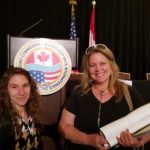These were the notes I took at the International Joint Commission, Status of the Great Lakes Water Quality Agreement
I thought it was very important others read my notes.
Here is what we said about the Western Lake Erie Basin in the last draft: READ HERE
June 18, 2019 – Milwaukee Wisconsin Round Table Discussion Meeting
International Joint Commission (IJC) – Status of Great Lakes Water Quality Agreement
8 States – 2 Provinces of Canada
This IJC meeting is assessing progress of the Great Lakes Water Quality Agreement and take suggestions from stakeholders and experts, the need for a united front is necessary to progress.
IJC needs to be the watchdog of the Great Lakes…not just Canada or USA – elevate and help the 2 parties in a partisan way. This group has been taking science and using it to act as an advocate that can protect the public trust since 1972.
This meeting took recommendations for additional actions and priorities governments can undertake to improve water quality. A report will be published after data is reviewed about the findings from this meeting.
Major Challenges for the next 10 years ~ need resolve
- environmental education; as a curriculum for every grade, the adult population, and decision makers
- non point source – what happens on the land, happens to the water
- chemicals – ag chemicals, phosphorus, pesticides, fertilizers, lawns,
- pharmaceuticals
- wastewater discharges – nutrients
- party division with politicians and shortsighted decisions which are not based on science
- disconnect in public involvement
- emerging contaminants – companies do their own testing and reporting and give public safety results, lack of independent studies
- population continues to grow and migrate as water quantity issues begin causing more stress to the lakes ( i.e more cars & more concrete)
- restoration v/s adaption – can we go back to something from a previous time period or do we need to adapt to current conditions
- treaties and 1st nation indigenous communities need to be protected
- invasive species from every classification, plants, animals, muscles are displacing natives and causing loss of habitat
- climate change is becoming related to many facets
- lack of proper enforcement – there are many indicators that enforcement of current laws are necessary
- corporate interest should never be more important than public interest – economy vs environment
- old and failing infrastructure
Elaborated Discussion of List (above)
The Great Lakes Water Quality Agreement (GLWQA) is not set up to work on Climate Change. It has created a good science for decision making, but shows more need for a partnerships between both nations (Canada & USA) to help with the impact we have already seen. Do we have the adaption and resilience to conquer climate change? If we wait, there may be terrible loss. IF it is not in the Water Quality Agreement, it is not going to happen. Less capacity to do anything about it when you don’t know what it is, so this meeting is dedicated to finding all of them to prioritize.
CHEMICAL LEGACIES
Agricultural practices, the way it is performed currently, is killing the Great Lakes and is a major contributor to water pollution. Best Management Practices are just simply not good enough. How are we able transform ag. so it can still feed people in the 21st century, but remove the negative incentives so we are able to have healthy systems?
Pharmaceutical pollution – what is in the Lake exactly? The food web is showing signs of pharmaceuticals in the water; estrogen cycles and long term health are being affected. The Great Lakes are a closed system that has potential to accumulate RX over a long period of time, and end up in our drinking water systems….there is no plan for the next system.
Biological collapse – all great lakes are threatened. Biological systems in the lakes are indicators for all life
Plastics and nano plastics are continuing to show up in fish and wildlife and humans. Single serving plastic is bad
Since 2016 reports less than 12 chemicals of concern. 10 years ago there were 100 chemicals of concern on this same list. Agreements have lost benchmarks and focus to rename PCB’s as chemicals of concern -this is embarrassing and this is going backwards
Prevention is key…regulatory systems are set up for fees and reporting instead of a pollution prevention strategy at the front end than the enforcement at he back end.
lack of enforcement is apparent, there still remain many regulations that are not followed to no end result.
2012 Agreement has made it harder to work with negotiators – works out the hammers of how to drive things. NO date of when measurable accountable, quantifiable,
Congress goes to the 42 areas of concern and impairments and achievable benchmarks. Meeting were held, benchmarks, summary documents. WE CAN DO BETTER than just meetings and assessments. What are the legs on the land doing than just having “meetings”
deferred maintenance – building maintenance to maintain from letting small problems get out of hand. VERY costly to mitigate or restore. Maintain on a regular basis instead
Binational strategies need to be attached and fixed…there will just be 42 more in another 10 years.
near shore science is coming along. Federal science is disappearing . Good academics – FreshWater Sciences, but all lack the nonpoint source/land connection
Accountability – reporting progress in Canada – US REPORTS nothing … not accountable.
Political parties should report more on what they are working on for environment.
Huge water quality from climate change impacts. – nutrients, sediment, scouring, erosion, sediment choking, oxygen deleption. No strategy for climate change. There will be unprecedented floods and droughts, Shoreline protections, lack of habitat, changing wind patterns already affecting pollutants. No human health and safety plans for algal blooms
oil transportation lines. Iced over areas, how are you going to get oil spills into containment when there is ice on the Lakes? Do we even have equipment – underground delivery liines. confided disposal utilities. coal ash ponds.
no domestic regulatory body created Regulatory is missing. Where should we be appropriating. Domestic framework …cry will be from property owners that water is too high….pretty soon it will be it is too low…
Jurisdiction impacts. How is Great Lakes Water Quality Agreement working?
lack of urgency and movement forward
AOC is important…but laundry list is all over the place
education – ourselves and the public
agriculture standards are slipping – watered down
extreme events – funding of remediation of these big problems instead of prevention
how indigenous groups and minorities are left out
profile should connect people and hold entities accountable – timelines are not appearing important deadlines should be set. What happens if we do not reach these benchmarks?
much research is driven by agencies who have an interest in making money – not driven by science
focus on behavioral changes actionable on a personal level to make a difference
Catalyst for discussion and the GLRI for taking action and educating the public officials,
everything should be inclusive as possible.
tours of bad areas in political efforts, not just the success story
environmental justice and impacting segments to make sure they are represented and board representatives with selection CSC with substances that are already known instead of researching new substances.
protection and restoration
fisheries need to be brought information in their own language and in their own land, instead of blasting..pinpoint and selectively reach niche
What is working well? GLRI – mechanism to stimulate action and collaboration. Gov is making progress with tackling service water problems.
Coordination with education of all jurisdiction with shared practices. LOTS of meetings, but need specific pintpointed topics
public trust has been damaged.
Question 3 What should IJC be more aware of and what should it tell itself of what it should work-on?
overlaps
PFAS
communications – we need to promote sharing of date so others can crunch data and find the important IJC creates the culture we can use to make your point.
create sense of urgency and enthusiasm about our shared waters
resources – human capital overlaps and other groups try to reinvent the wheel.
planning for climate refugees as Great Lakes becomes more desirable in next 25 years
guidance on safe fish levels. – average people only exist in theory.
Variety of contaminants. SYERGY of all these contaminants. suburbs and fisherman have 2 different problems.
parties are not reaching out to everybody. Students, teenagers, who is communicating with these people? They need to be interested now…they will not know when it is their turn to step up to the plate. Groups that are active should be closer to the people and have more foresight into the future. IF we know, we are not communicating it.
Investment in science, are about remediation instead of finding the real causes and theoretical science of what we should do. We are not closer to environment justice, the ones needing justice are overlooked.
engagement and education, more divers, not just convening town halls along the great Lakes shore…get into the body of land and look outside of institutions and understand the importance of the great lakes and structure of governments. GLRI progress reports go beyond the gov. but help assess health and can reflect on their own structure to fix it or overlook it.
GLRI – Save Maumee is the only group in Indiana that is implementing the restoration suggested portion of the Upper Maumee watershed Management plan.



